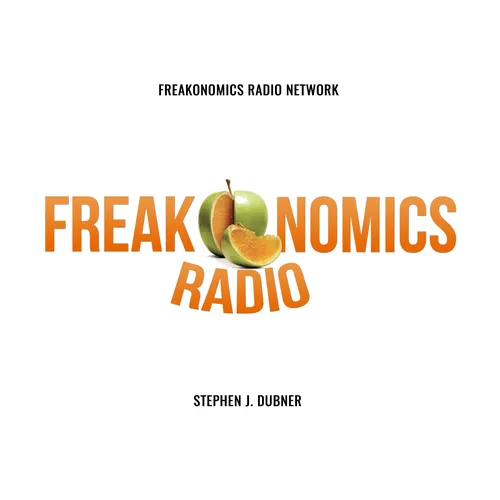
Freakonomics Radio
Freakonomics co-author Stephen J. Dubner uncovers the hidden side of everything. Why is it safer to fly in an airplane than drive a car? How do we decide whom to marry? Why is the media so full of bad news? Also: things you never knew you wanted to know about wolves, bananas, pollution, search engines, and the quirks of human behavior.
To get every show in the Freakonomics Radio Network without ads and a monthly bonus episode of Freakonomics Radio, start a free trial for SiriusXM Podcasts+ on Apple Podcasts or by visiting siriusxm.com/podcastsplus.
- Update frequency
- every 5 days
- Average duration
- 41 minutes
- Episodes
- 857
- Years Active
- 2010 - 2025

412. What Happens When Everyone Stays Home to Eat?
Covid-19 has shocked our food-supply system like nothing in modern history. We examine the winners, the losers, the unintended consequences — and just how much toilet paper one household really needs…

411. Is $2 Trillion the Right Medicine for a Sick Economy?
Congress just passed the biggest aid package in modern history. We ask six former White House economic advisors and one U.S. Senator: Will it actually work? What are its best and worst features? Wher…

410. What Does Covid-19 Mean for Cities (and Marriages)?
There are a lot of upsides to urban density — but viral contagion is not one of them. Also: a nationwide lockdown will show if familiarity really breeds contempt. And: how to help your neighbor.

409. The Side Effects of Social Distancing
In just a few weeks, the novel coronavirus has undone a century’s worth of our economic and social habits. What consequences will this have on our future — and is there a silver lining in this very b…

Why Rent Control Doesn’t Work (Ep. 373 Rebroadcast)
As cities become ever-more expensive, politicians and housing advocates keep calling for rent control. Economists think that’s a terrible idea. They say it helps a small (albeit noisy) group of rente…

408. Does Anyone Really Know What Socialism Is?
Trump says it would destroy us. Sanders says it will save us. The majority of millennials would like it to replace capitalism. But what is “it”? We bring in the economists to sort things out and tell…

407. Is There Really a “Loneliness Epidemic”?
That’s what some health officials are saying, but the data aren’t so clear. We look into what’s known (and not known) about the prevalence and effects of loneliness — including the possible upsides.

406. Can You Hear Me Now?
When he became chairman of the Federal Communications Commission, Ajit Pai announced that he was going to take a “weed whacker” to Obama-era regulations. So far, he’s kept his promise, and earned the…

405. Policymaking Is Not a Science (Yet)
Why do so many promising solutions — in education, medicine, criminal justice, etc. — fail to scale up into great policy? And can a new breed of “implementation scientists” crack the code?

404. Does the President Matter as Much as You Think?
We asked this same question nearly a decade ago. The answer then: probably not. But a lot has changed since then, and we’re three years into one of the most anomalous presidencies in American history…

How the San Francisco 49ers Stopped Being Losers (Ep. 350 Update)
One of the most storied (and valuable) sports franchises in the world had fallen far. So they decided to do a full reboot — and it worked: this week, they are headed back to the Super Bowl. Before th…

403. The Opioid Tragedy, Part 2: “It’s Not a Death Sentence”
One prescription drug is keeping some addicts from dying. So why isn’t it more widespread? A story of regulation, stigma, and the potentially fatal faith in abstinence.

402. The Opioid Tragedy, Part 1: “We’ve Addicted an Entire Generation”
How pharma greed, government subsidies, and a push to make pain the “fifth vital sign” kicked off a crisis that costs $80 billion a year and has killed hundreds of thousands of Americans.

5 Psychology Terms You’re Probably Misusing (Rebroadcast)
We all like to throw around terms that describe human behavior — “bystander apathy” and “steep learning curve” and “hard-wired.” Most of the time, they don’t actually mean what we think they mean. Bu…

The Zero-Minute Workout (Rebroadcast)
There is strong evidence that exercise is wildly beneficial. There is even stronger evidence that most people hate to exercise. So if a pill could mimic the effects of working out, why wouldn’t we wa…

401. How Many Prince Charleses Can There Be in One Room?
In a special holiday episode, Stephen Dubner and Angela Duckworth take turns asking each other questions about charisma, wealth vs. intellect, and (of course) grit.

Why Is This Man Running for President? (Update)
A year ago, nobody was taking Andrew Yang very seriously. Now he is America’s favorite entrepre-nerd, with a candidacy that keeps gaining momentum. This episode includes our Jan. 2019 conversation wi…

400. How to Hate Taxes a Little Bit Less
Every year, Americans short the I.R.S. nearly half a trillion dollars. Most ideas to increase compliance are more stick than carrot — scary letters, audits, and penalties. But what if we gave taxpaye…

399. Honey, I Grew the Economy
Innovation experts have long overlooked where a lot of innovation actually happens. The personal computer, the mountain bike, the artificial pancreas — none of these came from some big R&D lab, but f…

How to Change Your Mind (Rebroadcast)
There are a lot of barriers to changing your mind: ego, overconfidence, inertia — and cost. Politicians who flip-flop get mocked; family and friends who cross tribal borders are shunned. But shouldn’…